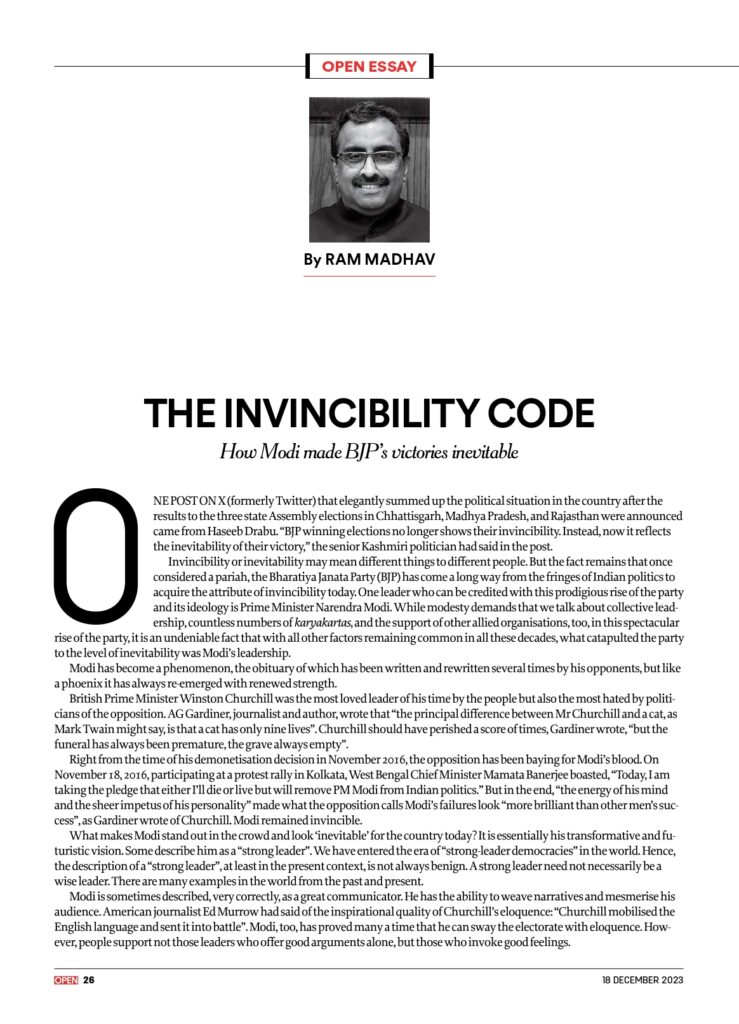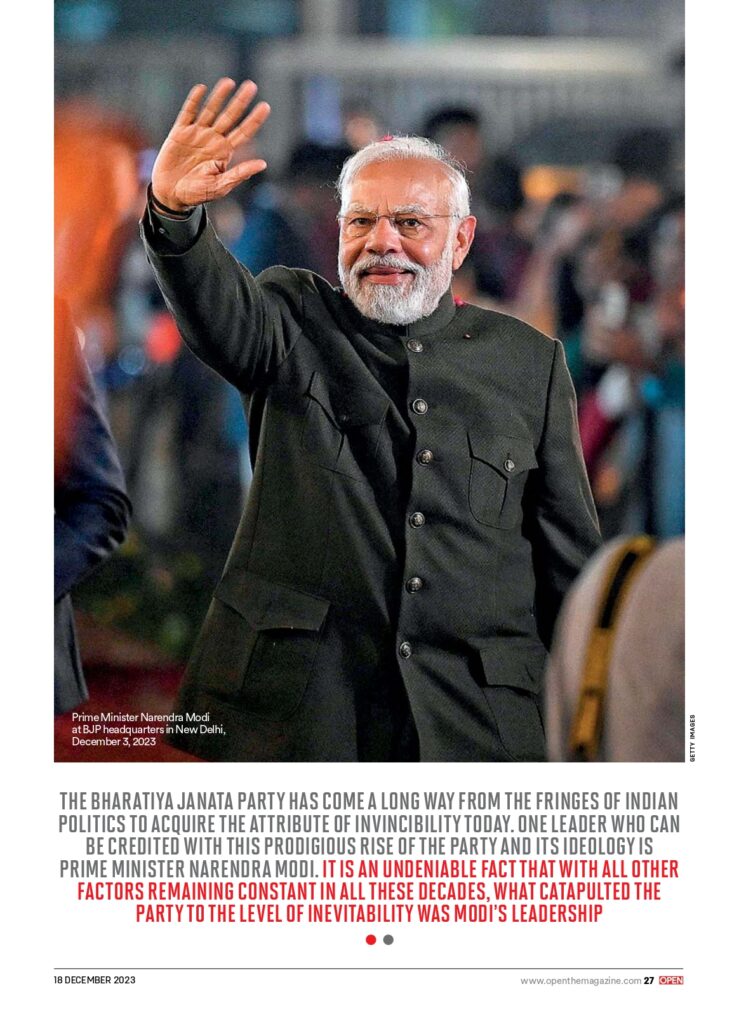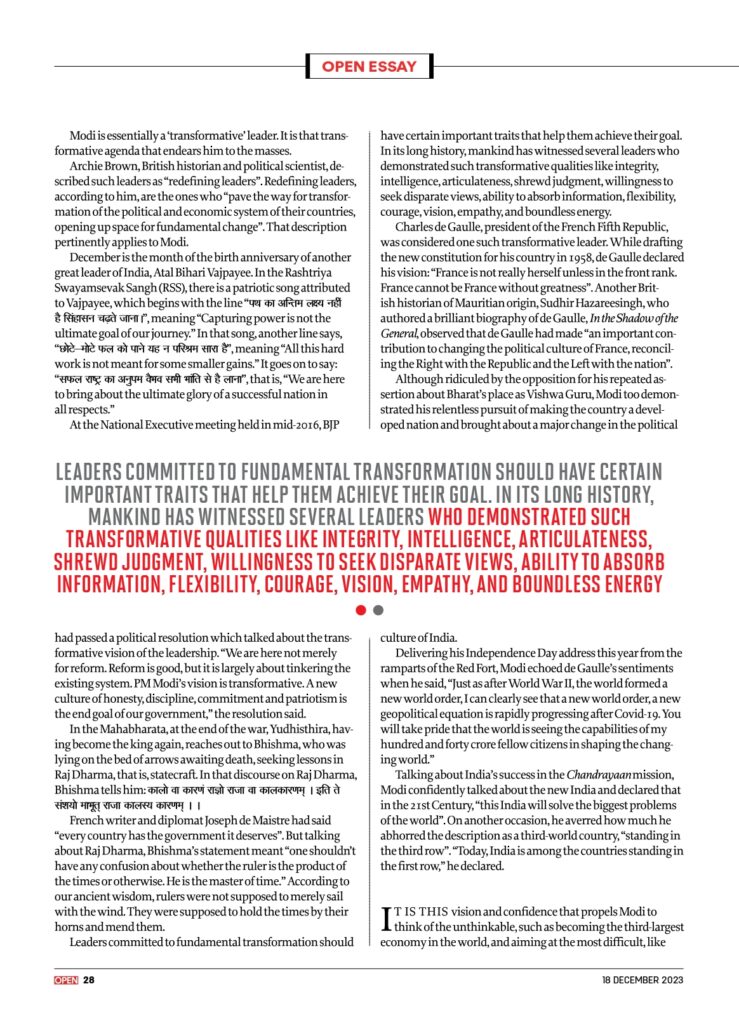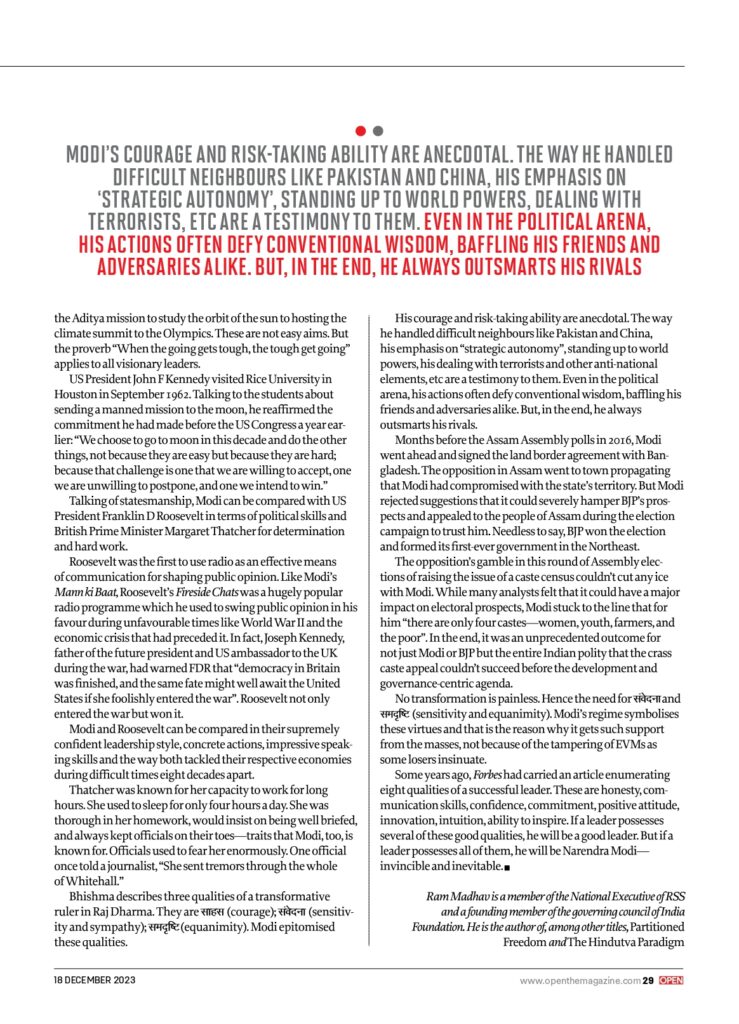
|
Getting your Trinity Audio player ready...
|
(The article was originally published in OPEN Magazine on December 08, 2023. Views expressed are personal.)
One post on X (formerly Twitter) that elegantly summed up the political situation in the country after the results to the three state Assembly elections in Chhattisgarh, Madhya Pradesh, and Rajasthan were announced came from Haseeb Drabu. “BJP winning elections no longer shows their invincibility. Instead, now it reflects the inevitability of their victory,” the senior Kashmiri politician had said in the post.
Invincibility or inevitability may mean different things to different people. But the fact remains that once considered a pariah, the Bharatiya Janata Party (BJP) has come a long way from the fringes of Indian politics to acquire the attribute of invincibility today. One leader who can be credited with this prodigious rise of the party and its ideology is Prime Minister Narendra Modi. While modesty demands that we talk about collective leadership, countless numbers of karyakartas, and the support of other allied organisations, too, in this spectacular rise of the party, it is an undeniable fact that with all other factors remaining common in all these decades, what catapulted the party to the level of inevitability was Modi’s leadership.
Modi has become a phenomenon, the obituary of which has been written and rewritten several times by his opponents, but like a phoenix it has always re-emerged with renewed strength.
British Prime Minister Winston Churchill was the most loved leader of his time by the people but also the most hated by politicians of the opposition. AG Gardiner, journalist and author, wrote that “the principal difference between Mr Churchill and a cat, as Mark Twain might say, is that a cat has only nine lives”. Churchill should have perished a score of times, Gardiner wrote, “but the funeral has always been premature, the grave always empty”.
Right from the time of his demonetisation decision in November 2016, the opposition has been baying for Modi’s blood. On November 18, 2016, participating at a protest rally in Kolkata, West Bengal Chief Minister Mamata Banerjee boasted, “Today, I am taking the pledge that either I’ll die or live but will remove PM Modi from Indian politics.” But in the end, “the energy of his mind and the sheer impetus of his personality” made what the opposition calls Modi’s failures look “more brilliant than other men’s success”, as Gardiner wrote of Churchill. Modi remained invincible.
What makes Modi stand out in the crowd and look ‘inevitable’ for the country today? It is essentially his transformative and futuristic vision. Some describe him as a “strong leader”. We have entered the era of “strong-leader democracies” in the world. Hence, the description of a “strong leader”, at least in the present context, is not always benign. A strong leader need not necessarily be a wise leader. There are many examples in the world from the past and present.
Modi is sometimes described, very correctly, as a great communicator. He has the ability to weave narratives and mesmerise his audience. American journalist Ed Murrow had said of the inspirational quality of Churchill’s eloquence: “Churchill mobilised the English language and sent it into battle”. Modi, too, has proved many a time that he can sway the electorate with eloquence. However, people support not those leaders who offer good arguments alone, but those who invoke good feelings.
Modi is essentially a ‘transformative’ leader. It is that transformative agenda that endears him to the masses.
Archie Brown, British historian and political scientist, described such leaders as “redefining leaders”. Redefining leaders, according to him, are the ones who “pave the way for transformation of the political and economic system of their countries, opening up space for fundamental change”. That description pertinently applies to Modi.
December is the month of the birth anniversary of another great leader of India, Atal Bihari Vajpayee. In the Rashtriya Swayamsevak Sangh (RSS), there is a patriotic song attributed to Vajpayee, which begins with the line “पथ का अन्तिम लक्ष्य नहीं है सिंहासन चढ़ते जाना।”, meaning “Capturing power is not the ultimate goal of our journey.” In that song, another line says, “छोटे-मोटे फल को पाने यह न परिश्रम सारा है”, meaning “All this hard work is not meant for some smaller gains.” It goes on to say: “सफल राष्ट्र का अनुपम वैभव सभी भांति से है लाना”, that is, “We are here to bring about the ultimate glory of a successful nation in all respects.”
At the National Executive meeting held in mid-2016, BJP had passed a political resolution which talked about the transformative vision of the leadership. “We are here not merely for reform. Reform is good, but it is largely about tinkering the existing system. PM Modi’s vision is transformative. A new culture of honesty, discipline, commitment and patriotism is the end goal of our government,” the resolution said.
In the Mahabharata, at the end of the war, Yudhisthira, having become the king again, reaches out to Bhishma, who was lying on the bed of arrows awaiting death, seeking lessons in Raj Dharma, that is, statecraft. In that discourse on Raj Dharma, Bhishma tells him: “कालो वा कारणं राज्ञो राजा वा कालकारणम् । इति ते संशयो माभूत् राजा कालस्य कारणम् ॥”
French writer and diplomat Joseph de Maistre had said “every country gets the government it deserves”. But talking about Raj Dharma, Bhishma’s statement meant “one shouldn’t have any confusion about whether the ruler is the product of the times or otherwise. He is the master of time.” According to our ancient wisdom, rulers were not supposed to merely sail with the wind. They were supposed to hold the times by their horns and mend them.
Leaders committed to fundamental transformation should have certain important traits that help them achieve their goal. In its long history, mankind has witnessed several leaders who demonstrated such transformative qualities like integrity, intelligence, articulateness, shrewd judgment, willingness to seek disparate views, ability to absorb information, flexibility, courage, vision, empathy, and boundless energy.
Charles de Gaulle, president of the French Fifth Republic, was considered one such transformative leader. While drafting the new constitution for his country in 1958, de Gaulle declared his vision: “France is not really herself unless in the front rank. France cannot be France without greatness”. Another British historian of Mauritian origin, Sudhir Hazareesingh, who authored a brilliant biography of de Gaulle, In the Shadow of the General, observed that de Gaulle had made “an important contribution to changing the political culture of France, reconciling the Right with the Republic and the Left with the nation”.
Although ridiculed by the opposition for his repeated assertion about Bharat’s place as Vishwa Guru, Modi too demonstrated his relentless pursuit of making the country a developed nation and brought about a major change in the political culture of India.
Delivering his Independence Day address this year from the ramparts of the Red Fort, Modi echoed de Gaulle’s sentiments when he said, “Just as after World War II, the world formed a new world order, I can clearly see that a new world order, a new geopolitical equation is rapidly progressing after Covid-19. You will take pride that the world is seeing the capabilities of my hundred and forty crore fellow citizens in shaping the changing world.”
Talking about India’s success in the Chandrayaan mission, Modi confidently talked about the new India and declared that in the 21st Century, “this India will solve the biggest problems of the world”. On another occasion, he averred how much he abhorred the description as a third-world country, “standing in the third row”. “Today, India is among the countries standing in the first row,” he declared.
It is this vision and confidence that propels Modi to think of the unthinkable, such as becoming the third-largest economy in the world, and aiming at the most difficult, like the Aditya mission to study the orbit of the sun to hosting the climate summit to the Olympics. These are not easy aims. But the proverb “When the going gets tough, the tough get going” applies to all visionary leaders.
US President John F Kennedy visited Rice University in Houston in September 1962. Talking to the students about sending a manned mission to the moon, he reaffirmed the commitment he had made before the US Congress a year earlier: “We choose to go to moon in this decade and do the other things, not because they are easy but because they are hard; because that challenge is one that we are willing to accept, one we are unwilling to postpone, and one we intend to win.”
Talking of statesmanship, Modi can be compared with US President Franklin D Roosevelt in terms of political skills and British Prime Minister Margaret Thatcher for determination and hard work.
Roosevelt was the first to use radio as an effective means of communication for shaping public opinion. Like Modi’s Mann ki Baat, Roosevelt’s Fireside Chats was a hugely popular radio programme which he used to swing public opinion in his favour during unfavourable times like World War II and the economic crisis that had preceded it. In fact, Joseph Kennedy, father of the future president and US ambassador to the UK during the war, had warned FDR that “democracy in Britain was finished, and the same fate might well await the United States if she foolishly entered the war”. Roosevelt not only entered the war but won it.
Modi and Roosevelt can be compared in their supremely confident leadership style, concrete actions, impressive speaking skills and the way both tackled their respective economies during difficult times eight decades apart.
Thatcher was known for her capacity to work for long hours. She used to sleep for only four hours a day. She was thorough in her homework, would insist on being well briefed, and always kept officials on their toes—traits that Modi, too, is known for. Officials used to fear her enormously. One official once told a journalist, “She sent tremors through the whole of Whitehall.”
Bhishma describes three qualities of a transformative ruler in Raj Dharma. They are साहस (courage); संवेदना (sensitivity and sympathy); समदृष्टि (equanimity). Modi epitomised these qualities.
His courage and risk-taking ability are anecdotal. The way he handled difficult neighbours like Pakistan and China, or his emphasis on “strategic autonomy”, standing up to world powers, or his dealing with terrorists and other anti-national elements are a testimony to them. Even in the political arena, his actions often defy conventional wisdom, baffling his friends and adversaries alike. But, in the end, he always outsmarts his rivals.
Months before the Assam Assembly polls in 2016, Modi went ahead and signed the land border agreement with Bangladesh. The opposition in Assam went to town propagating that Modi had compromised with the state’s territory. But Modi rejected suggestions that it could severely hamper BJP’s prospects and appealed to the people of Assam during the election campaign to trust him. Needless to say, BJP won the election and formed its first-ever government in the Northeast.
The opposition’s gamble in this round of Assembly elections of raising the issue of a caste census couldn’t cut any ice with Modi. While many analysts felt that it could have a major impact on electoral prospects, Modi stuck to the line that for him “there are only four castes—women, youth, farmers, and the poor”. In the end, it was an unprecedented outcome for not just Modi or BJP but the entire Indian polity that the crass caste appeal couldn’t succeed before the development and governance-centric agenda.
No transformation is painless. Hence the need for संवेदना and समदृष्टि(sensitivity and equanimity). Modi’s regime symbolises these virtues and that is the reason why it gets such support from the masses, not because of the tampering of EVMs as some losers insinuate.
Some years ago, Forbes had carried an article enumerating eight qualities of a successful leader. These are honesty, communication skills, confidence, commitment, positive attitude, innovation, intuition, ability to inspire. If a leader possesses several of these good qualities, he will be a good leader. But if a leader possesses all of them, he will be Narendra Modi—invincible and inevitable.







